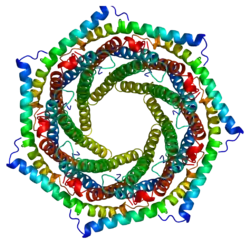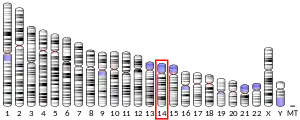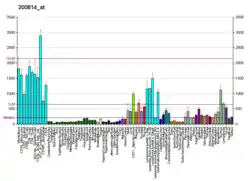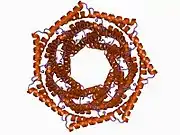PSME1
Proteasome activator complex subunit 1 is a protein that in humans is encoded by the PSME1 gene.[4][5]
Function
The 26S proteasome is a multicatalytic proteinase complex with a highly ordered structure composed of 2 complexes, a 20S core and a 19S regulator. The 20S core is composed of 4 rings of 28 non-identical subunits; 2 rings are composed of 7 alpha subunits and 2 rings are composed of 7 beta subunits. The 19S regulator is composed of a base, which contains 6 ATPase subunits and 2 non-ATPase subunits, and a lid, which contains up to 10 non-ATPase subunits. Proteasomes are distributed throughout eukaryotic cells at a high concentration and cleave peptides in an ATP/ubiquitin-dependent process in a non-lysosomal pathway. An essential function of a modified proteasome, the immunoproteasome, is the processing of class I MHC peptides. The immunoproteasome contains an alternate regulator, referred to as the 11S regulator or PA28, that replaces the 19S regulator. Three subunits (alpha, beta and gamma) of the 11S regulator have been identified. This gene encodes the alpha subunit of the 11S regulator, one of the two 11S subunits that is induced by gamma-interferon. Three alpha and three beta subunits combine to form a heterohexameric ring. Two transcripts encoding different isoforms have been identified.[5]
References
- ENSG00000284916 GRCh38: Ensembl release 89: ENSG00000092010, ENSG00000284916 - Ensembl, May 2017
- "Human PubMed Reference:". National Center for Biotechnology Information, U.S. National Library of Medicine.
- "Mouse PubMed Reference:". National Center for Biotechnology Information, U.S. National Library of Medicine.
- Honoré B, Leffers H, Madsen P, Celis JE (Feb 1994). "Interferon-gamma up-regulates a unique set of proteins in human keratinocytes. Molecular cloning and expression of the cDNA encoding the RGD-sequence-containing protein IGUP I-5111". Eur J Biochem. 218 (2): 421–30. doi:10.1111/j.1432-1033.1993.tb18392.x. PMID 8269930.
- "Entrez Gene: PSME1 proteasome (prosome, macropain) activator subunit 1 (PA28 alpha)".
- Wilkinson FL, Holaska JM, Zhang Z, Sharma A, Manilal S, Holt I, Stamm S, Wilson KL, Morris GE (Jun 2003). "Emerin interacts in vitro with the splicing-associated factor, YT521-B". Eur. J. Biochem. 270 (11): 2459–66. doi:10.1046/j.1432-1033.2003.03617.x. PMID 12755701.
- Rual JF, Venkatesan K, Hao T, Hirozane-Kishikawa T, Dricot A, Li N, Berriz GF, Gibbons FD, Dreze M, Ayivi-Guedehoussou N, Klitgord N, Simon C, Boxem M, Milstein S, Rosenberg J, Goldberg DS, Zhang LV, Wong SL, Franklin G, Li S, Albala JS, Lim J, Fraughton C, Llamosas E, Cevik S, Bex C, Lamesch P, Sikorski RS, Vandenhaute J, Zoghbi HY, Smolyar A, Bosak S, Sequerra R, Doucette-Stamm L, Cusick ME, Hill DE, Roth FP, Vidal M (Oct 2005). "Towards a proteome-scale map of the human protein-protein interaction network". Nature. 437 (7062): 1173–8. Bibcode:2005Natur.437.1173R. doi:10.1038/nature04209. PMID 16189514.
- Ahn K, Erlander M, Leturcq D, Peterson PA, Früh K, Yang Y (Jul 1996). "In vivo characterization of the proteasome regulator PA28". J. Biol. Chem. 271 (30): 18237–42. doi:10.1074/jbc.271.30.18237. PMID 8663520.
Further reading
- Coux O, Tanaka K, Goldberg AL (1996). "Structure and functions of the 20S and 26S proteasomes". Annu. Rev. Biochem. 65: 801–47. doi:10.1146/annurev.bi.65.070196.004101. PMID 8811196.
- Sijts A, Sun Y, Janek K, Kral S, Paschen A, Schadendorf D, Kloetzel PM (2002). "The role of the proteasome activator PA28 in MHC class I antigen processing". Mol. Immunol. 39 (3–4): 165–9. doi:10.1016/S0161-5890(02)00099-8. PMID 12200048.
- Goff SP (2003). "Death by deamination: a novel host restriction system for HIV-1". Cell. 114 (3): 281–3. doi:10.1016/S0092-8674(03)00602-0. PMID 12914693.
- Rasmussen HH, van Damme J, Puype M, Gesser B, Celis JE, Vandekerckhove J (1993). "Microsequences of 145 proteins recorded in the two-dimensional gel protein database of normal human epidermal keratinocytes". Electrophoresis. 13 (12): 960–9. doi:10.1002/elps.11501301199. PMID 1286667.
- Ahn JY, Tanahashi N, Akiyama K, Hisamatsu H, Noda C, Tanaka K, Chung CH, Shibmara N, Willy PJ, Mott JD (1995). "Primary structures of two homologous subunits of PA28, a gamma-interferon-inducible protein activator of the 20S proteasome". FEBS Lett. 366 (1): 37–42. doi:10.1016/0014-5793(95)00492-R. PMID 7789512.
- Realini C, Dubiel W, Pratt G, Ferrell K, Rechsteiner M (1994). "Molecular cloning and expression of a gamma-interferon-inducible activator of the multicatalytic protease". J. Biol. Chem. 269 (32): 20727–32. PMID 8051173.
- Ahn K, Erlander M, Leturcq D, Peterson PA, Früh K, Yang Y (1996). "In vivo characterization of the proteasome regulator PA28". J. Biol. Chem. 271 (30): 18237–42. doi:10.1074/jbc.271.30.18237. PMID 8663520.
- Bonaldo MF, Lennon G, Soares MB (1997). "Normalization and subtraction: two approaches to facilitate gene discovery". Genome Res. 6 (9): 791–806. doi:10.1101/gr.6.9.791. PMID 8889548.
- Seeger M, Ferrell K, Frank R, Dubiel W (1997). "HIV-1 tat inhibits the 20 S proteasome and its 11 S regulator-mediated activation". J. Biol. Chem. 272 (13): 8145–8148. doi:10.1074/jbc.272.13.8145. PMID 9079628.
- Soza A, Knuehl C, Groettrup M, Henklein P, Tanaka K, Kloetzel PM (1997). "Expression and subcellular localization of mouse 20S proteasome activator complex PA28". FEBS Lett. 413 (1): 27–34. doi:10.1016/S0014-5793(97)00864-8. PMID 9287111.
- McCusker D, Jones T, Sheer D, Trowsdale J (1998). "Genetic relationships of the genes encoding the human proteasome beta subunits and the proteasome PA28 complex". Genomics. 45 (2): 362–7. doi:10.1006/geno.1997.4948. PMID 9344661.
- Johnston SC, Whitby FG, Realini C, Rechsteiner M, Hill CP (1998). "The proteasome 11S regulator subunit REG alpha (PA28 alpha) is a heptamer". Protein Sci. 6 (11): 2469–73. doi:10.1002/pro.5560061123. PMC 2143584. PMID 9385652.
- Wang X, Omura S, Szweda LI, Yang Y, Bérard J, Seminaro J, Wu J (1998). "Rapamycin inhibits proteasome activator expression and proteasome activity". Eur. J. Immunol. 27 (11): 2781–6. doi:10.1002/eji.1830271106. PMID 9394799.
- Knowlton JR, Johnston SC, Whitby FG, Realini C, Zhang Z, Rechsteiner M, Hill CP (1998). "Structure of the proteasome activator REGalpha (PA28alpha)". Nature. 390 (6660): 639–43. Bibcode:1997Natur.390..639K. doi:10.1038/37670. PMID 9403698.
- Kohda K, Ishibashi T, Shimbara N, Tanaka K, Matsuda Y, Kasahara M (1998). "Characterization of the mouse PA28 activator complex gene family: complete organizations of the three member genes and a physical map of the approximately 150-kb region containing the alpha- and beta-subunit genes". J. Immunol. 160 (10): 4923–35. PMID 9590240.
- Madani N, Kabat D (1998). "An endogenous inhibitor of human immunodeficiency virus in human lymphocytes is overcome by the viral Vif protein". J. Virol. 72 (12): 10251–5. PMC 110608. PMID 9811770.
- Simon JH, Gaddis NC, Fouchier RA, Malim MH (1998). "Evidence for a newly discovered cellular anti-HIV-1 phenotype". Nat. Med. 4 (12): 1397–400. doi:10.1038/3987. PMID 9846577.
- McCusker D, Wilson M, Trowsdale J (1999). "Organization of the genes encoding the human proteasome activators PA28alpha and beta". Immunogenetics. 49 (5): 438–45. doi:10.1007/s002510050517. PMID 10199920.




